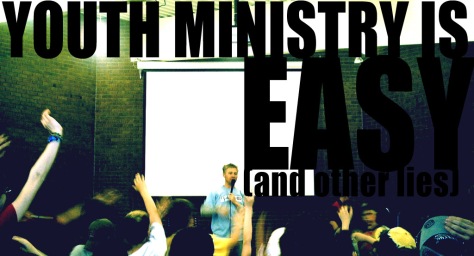Lie #2: Youth Pastor as Camp Counselor
Continuing with the series of misconceptions/stereotypes/lies in youth ministry that I’ve been running into lately, is the idea that the ideal youth pastor looks something not unlike this:

The idea that the ideal youth pastor is the goofy, outgoing, games-and-ridiculous-fun-programming-camp-counselor kind of guy is one that I’ve wrestled with for since I started into the youth ministry program at Cedarville. Mostly because I’m not that kind of guy. I’m naturally introverted, not the most expressive or out-there kind of speaker (although, as this and many other pictures will tell you, I have no problem with goofiness or acting silly). But I’ve always wondered if that put me a bit behind in the youth ministry thing, as if because I wasn’t THAT guy, I’d be left to ineffective or boring youth ministry that everyone would eventually leave.
This, I’m coming to learn, is the complete opposite of the truth.
Yes, there certainly is a need to be outgoing, to be fun and silly and exciting in youth ministry. Teens love to have fun, to be able to relax and just enjoy themselves and, given the right context and motivation, be goofy and silly. But as much as teens are looking for fun and excitement, there is a growing awareness of the need to go deep, to define themselves in light of something bigger than themselves. We’ve seen this in the earlier half of the Millennial generation, with our deep desire and belief that we can change the world. Students today are more aware of the harsh realities of life and the need for something bigger than themselves to navigate the tough times they find themselves in, both in their personal development and in the world in which they are growing up.
And this is precisely why the camp counseling, fun-and-games type of youth pastor mentality will fall short with this generation. Camp counseling is awesome. I know, I was one for two years in a row. And coming to terms with this idea has been hard, because much of my desire to pursue youth ministry arose out of my experiences as a camp counselor. But with the needs of students to have meaningful relationships and a purpose and mission bigger than themselves, youth ministry will need to go deeper, think bigger, and plan more than your average camp counselor is used to doing.
A great resource and much of the inspiration for these thoughts has been Sustainable Youth Ministry by Mark DeVries. In his chapter called “Architecting the Constellation,” he addresses the problem of the camp counselor mindset, making the claim that the role of “camp counselor” in youth ministry is that of the volunteer, while the youth pastor plays the role of making sure these relationships are meaningful and deep:
What would happen if professional youth workers took the radical step of seeing their relationship with students as secondary? What would happen if, instead, youth workers recognized that their primary work was ensuring that each student in the ministry had multiple godly adults pouring into his or her life? What would happen if we reconfigured youth ministry in such a way that the paid youth worker was primarily the architect of a constellation of relationships?
In this mindset, the majority of the time of the youth pastor is to build into volunteers who will build into students. This is where the camp counselor youth pastor falls short: “In this design, the teenager is no longer… dependent on the faithfulness, longevity or availability of a single member of the body of Christ.”
In camp culture, the counselor is the key relationship for students during the week. Much of the weight of the campers’ relationship to Christ is on the shoulders of the counselor. This mindset transferred to long-term youth ministry will result in burn-out and over-dependence on one individual. Shifting this mindset isn’t easy, but doing so has the potential to surround students with meaningful relationships that all point from various perspectives toward Christ and the importance and relevance of Him in the lives of teens. Especially as a youth ministry grows, and more teens are brought in, the camp counselor youth pastor cannot sustain ministering to every student individually. Again, the mindset of students as secondary, focusing on volunteers and building relationships around students really puts the students at the focus on the overall ministry, rather than the youth pastor and his or her ability to sustain relationships with every student.

LIE #2 on the money as well. I also have spent too much time trying to be the prototype when it’s not who I really am. I have learned that the bottom line is, I’m quirky. God called me to where He wants me because my quirks are the best fit in the spot He has designed for me. To try and fit the mold of the prototypes is robbing myself of the effectiveness God had planned when he gave me my personality and quirks in the first place.
Bravo on the article.